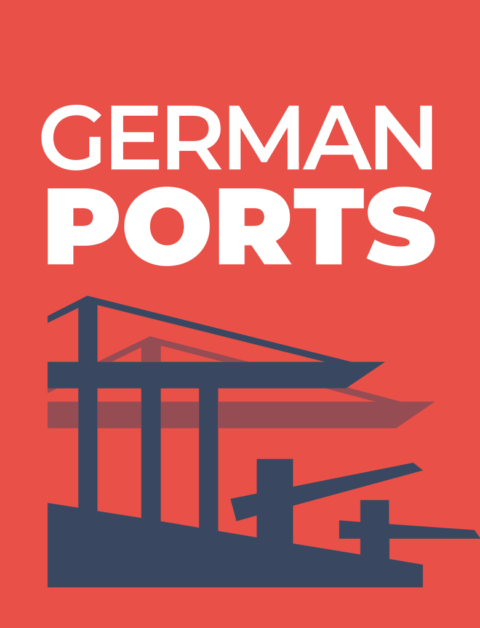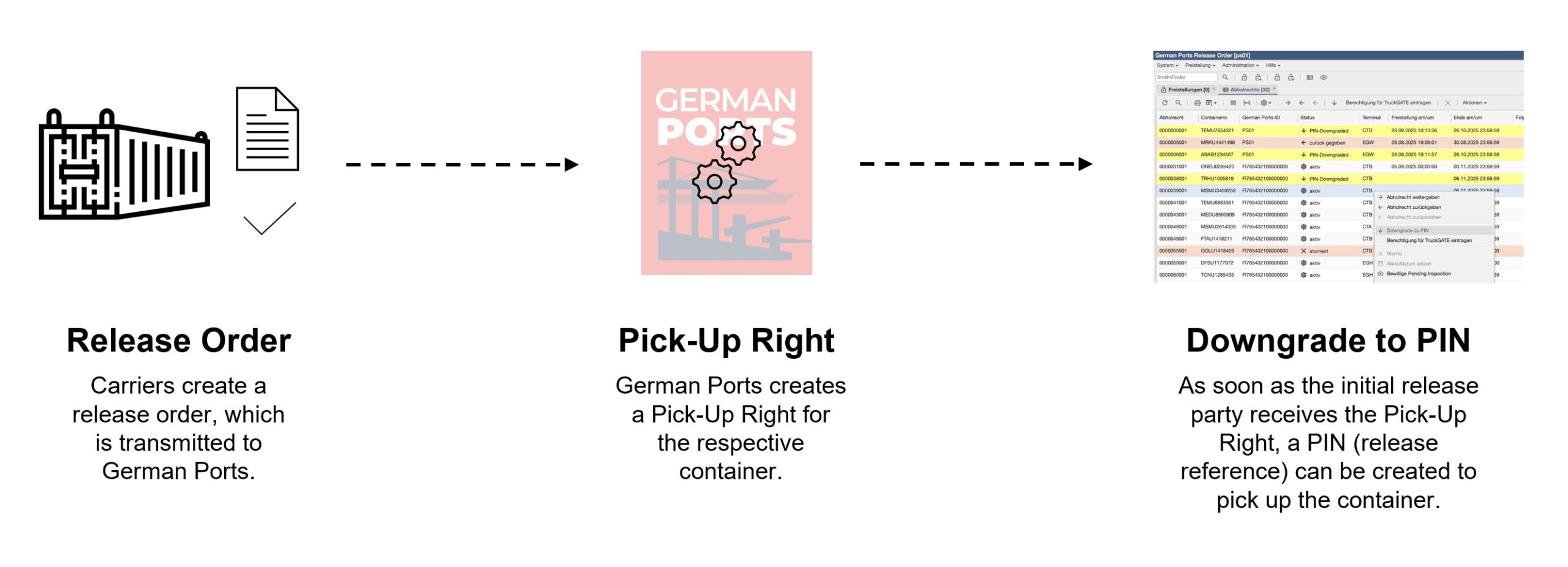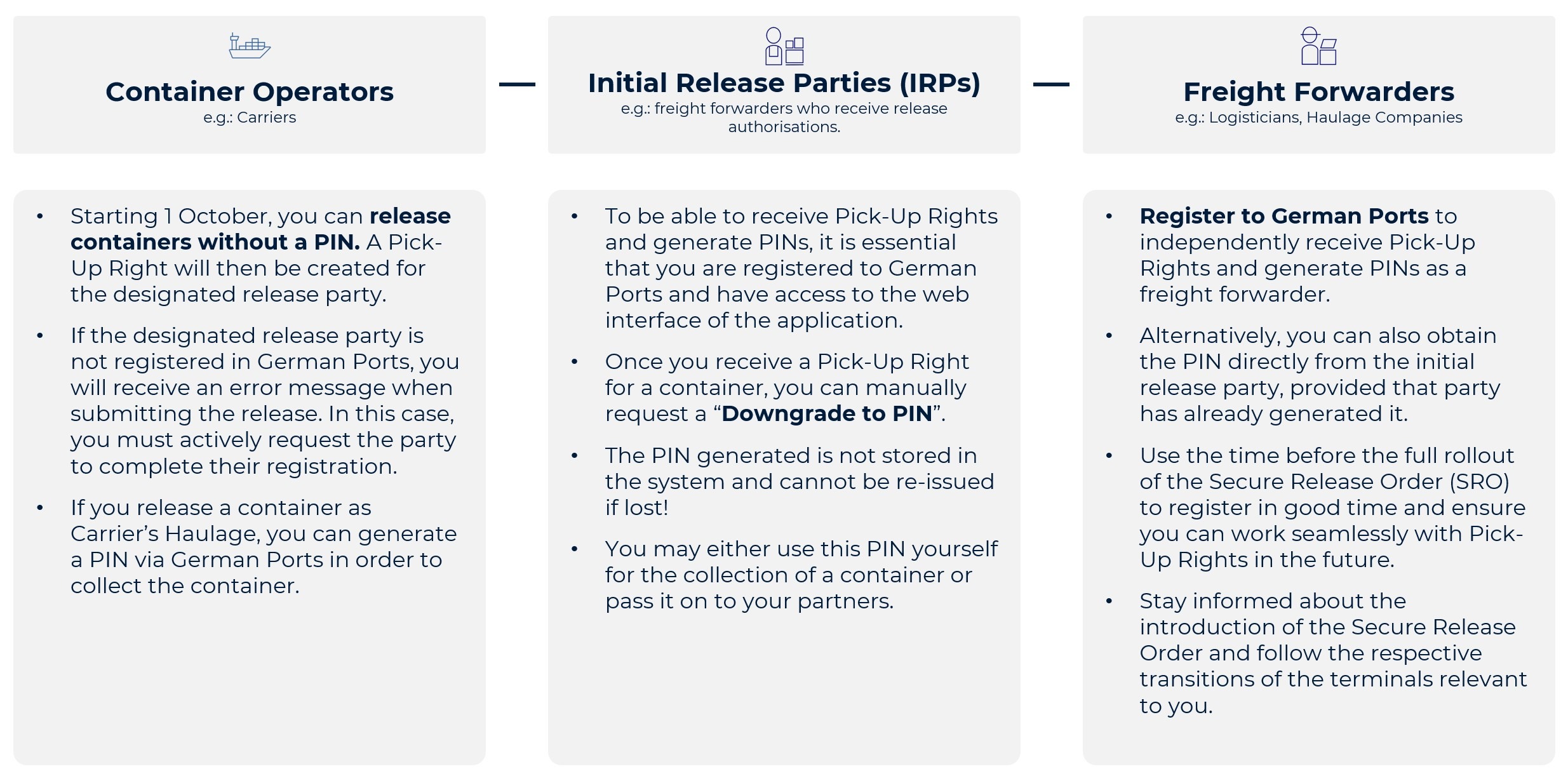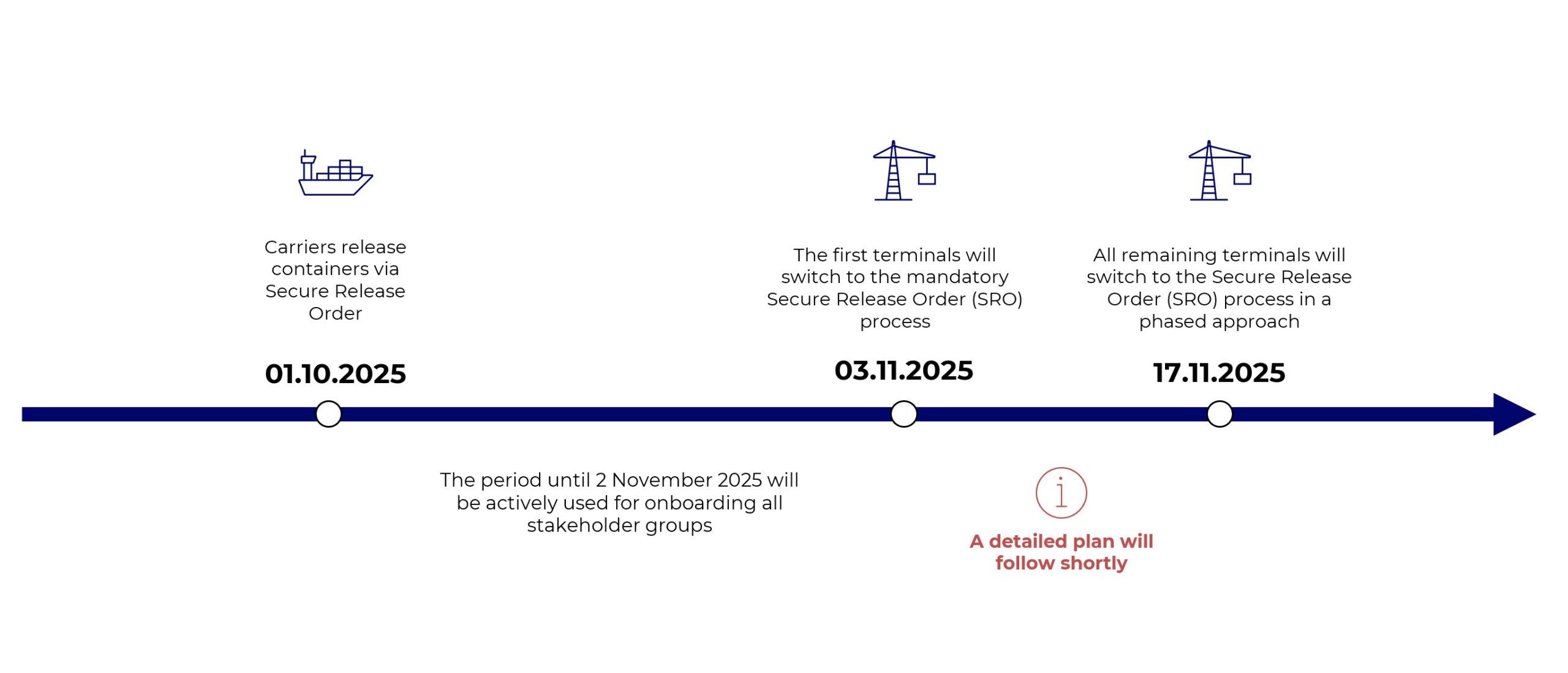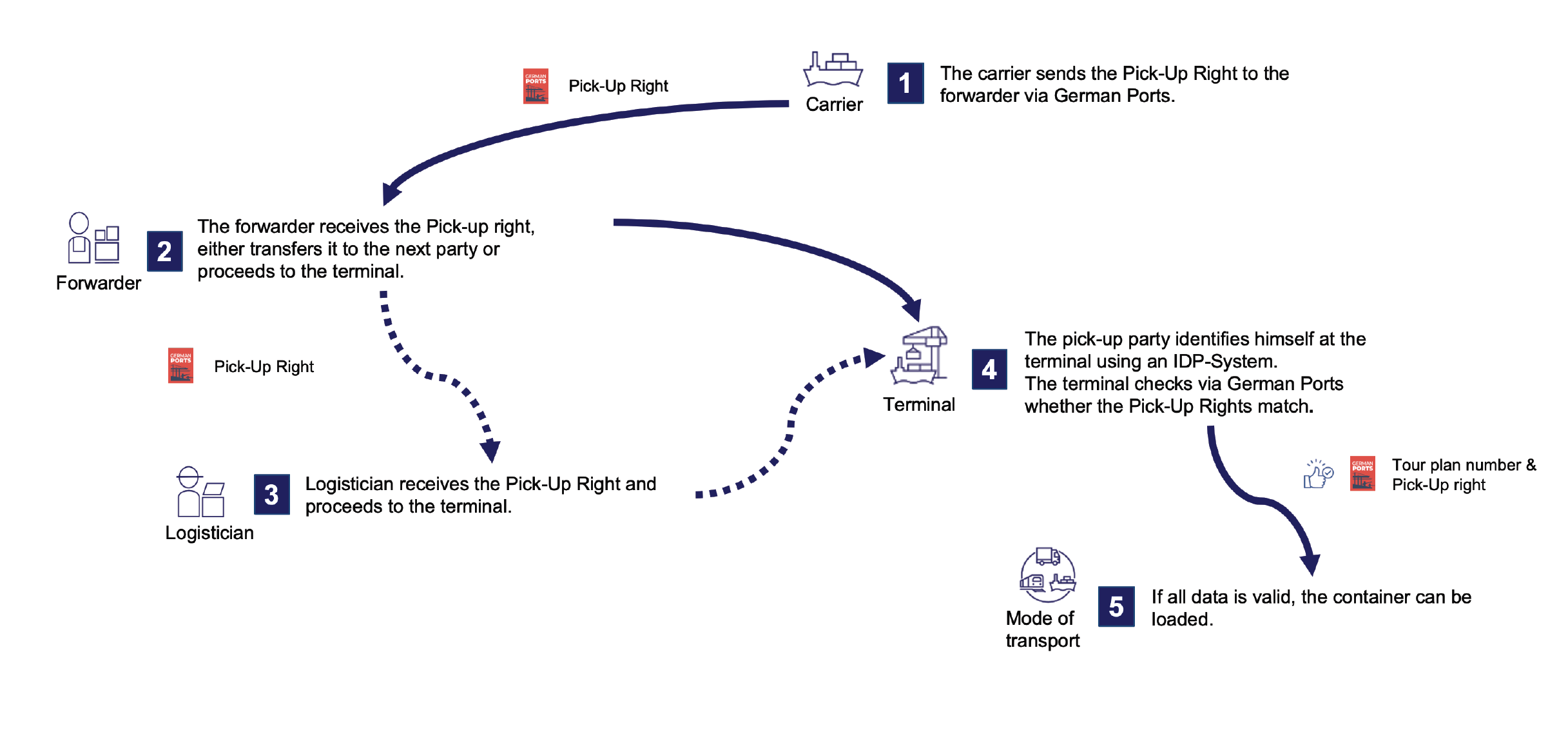More security
through digitalisation
in our harbours
With the German Ports Secure Release Order, the collection processes are
of the German seaports digitised, standardised and secured.
German Ports Secure Release Order
German Ports: Our vision
German Ports is shaping a secure, transparent and digital future for container handling in German seaports. With a standardised digital approval process, we create transparency, increase security and create a reliable basis for future-proof port logistics.
Specific Release Process
Roles and involved parties
FAQ German Ports
The introduction will not be postponed, but will take place in stages. The German Ports platform is available from 01 October. The actual utilisation is carried out by the shipowners from 01 October to 03 November at the latest, as soon as a sufficient number of initial shipowners are available for the respective shipowner. Release Parties is connected.
German seaports are part of the critical infrastructure and therefore require a particularly reliable and secure approach when introducing new processes. In order to meet this requirement, the Secure Release Order (SRO) will be introduced on 1 October 2025 in a stable and gradual onboarding process. The aim is to enable a secure transition for everyone involved and at the same time to strengthen the resilience of the import processes in the long term.
In order to minimise possible implementation risks, the changeover is being carried out in stages.
The primary goal is to both develop the German Ports, as well as stabilising the associated processes of all those involved and using this time for active onboarding. During this time, tests are therefore carried out, both technically and professionally, as well as further coordination rounds. Please note the areas Latest news and Events.
In order to minimise possible implementation risks, the changeover is being carried out in stages.
Shipowners will announce the launch date with their Initial Release Party (IRP)i.e. as a rule Haulage companies, who receive the right of exemption and coordinate this accordingly. with the respective customers communicate. It is therefore important to remain in close dialogue during this phase.
Haulage companies that are not yet connected can during the Onboarding phase (01 October to 02 November 2025) via "Downgrade to PIN" receive a PIN from the IRP and therefore do not yet need to be connected in October.
This may indeed be the case. For shipowners, who are already working productively with the portal, the exemption is then granted by "Downgrade to PIN", for shipowners, who have not yet changed over by PIN.
Individual terminals will begin to check the digital collection right on 3 November. According to the current status, further terminals will follow 2 weeks later. An exact plan of when which terminal will start, is currently being harmonised and shortly here on the portal announced.
2 admin users can be set up per client.
Admin users can only be changed via Support. Please create the user you want to use as an admin yourself. Then please let Support know which user you want to use as an admin. If you already have two admin users, please also let us know which user's admin rights are to be withdrawn.
German Ports is pursuing the goal of making the collection process for import containers in the German seaports of Bremerhaven, Hamburg and Wilhelmshaven more secure. A standardised, digital collection process is to replace the current exemption PIN with a pin-free, digital collection authorisation. A standardised process that is not only used at all locations, but also by all economic operators in the supply chain, should also strengthen the attractiveness of German seaports in international competition.
Commissioning will begin on 1 October 2025 and will take place in stages.
A basic monthly fee of € 60.00 per contractual partner (DAKOSY for Hamburg, dbh for Bremerhaven and Wilhelmshaven) is charged for the use of German Ports. In addition, the following costs are charged on a case-by-case basis:
- Creation of a collection right: € 0.80 per creation
- Activation of a pick-up right: € 0.80 per activation
- Forwarding a pick-up right: € 0.40 per forwarding
- Requesting a collection right: € 0.39 per exempted container
Further information can be found here: Prices - German Ports
To be able to use the new digital exemption procedure, companies can first register at Registration for participation in German Ports - German Ports register. They will then receive the contract documents. As soon as DAKOSY or dbh logistics IT receives these signed documents, the technical connection and activation on the web platforms (German Ports, IMP, BIT) can take place.
Firstly, you need to register your company in German Ports via Registration - German Ports - Borderless harbour flow register. Your designated administrators can then set up various branches and user accounts on the platform. Further information can be found in the associated User guide.
We are currently receiving a large number of registrations, which we are processing one after the other as quickly as possible. We therefore ask for your patience. You will receive your contract documents in the next few days and the corresponding access data to German Ports after signing the contract.
Once you have successfully registered and signed the contract, you can be connected to the test system. Please get in touch with us, for example via our contact form on our website: Contact - German Ports - Borderless harbour flow
You can use German Ports both via an interface and via the web application. Please specify which form of connection you require when registering.
Whether the consignee must be registered with German Ports as the rights holder depends on how the cooperation between consignee and forwarder is contractually regulated - in particular, who is to assume the right of indemnity according to the assignment agreement.
In practice, there are usually two options:
- The consignee manages the exemption himself. In this case, the consignee receives the right of collection directly via German Ports and only instructs the freight forwarder to collect the goods. Consequence: The consignee must be registered and can then pass on the collection right to the freight forwarder.
- The freight forwarder assumes the indemnity in his own name. In this case, the right of indemnity is transferred from the consignee to the freight forwarder by means of an assignment agreement, so that the freight forwarder manages the indemnity independently. Consequence: In this case, the freight forwarder must be registered.
To summarise: Those who have to register are not from the system specifications of German Ports, but depends on the contractual distribution of roles between consignee and forwarder. The decisive factor is who should ultimately receive and manage the collection right.
German Ports itself does not manage any assignment agreements and is not involved in any contractual constellations. The platform serves exclusively to provide collection rights and to enable their transfer.
The system is secured across several levels - including through proven cloud and Azure mechanisms such as redundancy, regular backups with recovery options, continuous monitoring and rapid response in the event of a fault.
In the event of a system failure (German Ports/TR02/IDP systems), no documentation of the deliveries needs to be added.
The time of system outages is shown in German Ports for the users of the authorities.
You will receive further information from our webinars here. User-specific information, documentation & guides can also be found on the German Ports website under the menu item Roles to view. We will also be providing video tutorials in the coming weeks explaining how to use the application.
For further questions please use our Contact form for the port in question or call us on +49 421 30902810 for Bremerhaven & Wilhelmshaven or +49 40 37860970 for Hamburg.
News and events
Free webinar -
German Ports (in english language)
| 17 September 2025 10-11 a.m.
We invite all freight forwarders, logistics companies, transport companies and rail network operators to a free webinar on September 17, 2025 from 10:00 - 11:00 to learn about the latest developments in the German Ports - Secure Release Order project. The project aims to make the release process digitalised and [...]
Free webinar -
German Ports (in German language)
| 16 September 2025 14:30-15:30
We invite all freight forwarders, logisticians, haulage companies and RUs/rail operators with a connection to collection processes in the German seaports to a free webinar on 16 September 2025 from 14:30 - 15:30 to inform them about the current developments in the German Ports - Secure Release Order project. This project aims both [...]
Free webinar -
German Ports for importers and IMP customers
| 11 September 2025 14-15:00
We invite all importers and IMP users to a free webinar on 11 September 2025 from 14:00 - 15:00 to inform them about the latest developments in the German Ports - Secure Release Order project, which aims to secure and digitise the release process as well as to implement the new [...]
Launch of the "Secure Release Order"
30 August 2025 | From 1 October 2025, a standardised digital release process called "Secure Release Order" will be introduced for all container imports via the German seaports of Bremen, Bremerhaven and Hamburg. The joint project between dbh Logistics IT AG and DAKOSY Datenkommunikationssystem AG stands for a secure, [...]
New IT to secure northern German ports against container theft
30 July 2025 | Bremerhaven, Wilhelmshaven and Hamburg are upgrading their ports. A new IT system is to make container theft and drug smuggling more difficult from October. Until now, anyone wishing to remove a container from the harbour site has needed a four-digit pin code. Shipowners, terminal employees, freight forwarders and lorry drivers receive this code, sometimes in unencrypted form. A procedure that [...]
"Secure Release Order" aims to prevent container theft in German ports
30 July 2025 | Digital instead of telephone: German ports rely on a standardised system to prevent unauthorised container collection. To prevent container theft and misuse of container release, German container ports are introducing a new security procedure on 1 October. Read more here Source: HANSA International Maritime Journal / Schiffahrts-Verlag Hansa [...]
